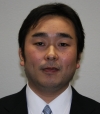
Mizuo Kansen
Assistant Professor

Takanobu Watanabe
Assistant Lecturer

Mizuo Kansen Assistant Professor |

Takanobu Watanabe Assistant Lecturer |
Promotion of the cooperation between the #University and industry
Visit to companies and consultation for cooperative research: as necessary
Attending various exhibitions/fairs: 16 times
Rent of Research Development Rooms: to 2 companies
Organizing University-Industry forums: 3 times
Organizing UBIC Training Seminars: 3 courses
Organizing "One-day Trial" Seminars: 3 times
Recognizing venture companies related with the University: 11 ventures
Accepting visitors: 1774 visitors
Providing the facilities for usage: A total of 2,690 persons
"Kumo" Salon (meeting with Aizu IT venture companies for discussion and exchange of views): 5 times"
Holding of ANF Morning Salon meetings: 8 times
Continuing program through cooperation with local ventures and other companies
The proposal on Advanced Education Program on Carrier Development for Foreign Students from Asia supported by METI and MEXT was approved in 2008. "International IT Nisshinkan" for fostering global leaders from Aizu was established in October 2008. In addition to nine foreign students who had entered this program in AY2008, ten foreign students from Asia (1 from Korea, 1from Vietnam, 2 from India, 6 from China) entered the program in AY2009. Besides regular courses in the Master Program, new courses and business Japanese courses were provided to the students. The program was promoted through University-Industry cooperation. Local venture companies, some companies in Fukushima prefecture, and companies in Tokyo, Nagoya and other areas provided various supports to the program, such as sending engineers as lecturers, giving comments on the development of curriculum, offering internship opportunities, and writing/editing supplement textbooks related with Aizu cultures, embedded and providing systems, business skills, etc. All nine students who had entered this program in AY2008 were employed by Japanese companies, which was the original purpose of the program. Two among them found a job at the companies in Fukushima Prefecture.
Continuing education program by cooperation among the university, industry, and local region
In "venture experiencing factories" Aizu IT Nisshinkan"' program , a total of 14 external speakers from companies, local region and government gave lectures in the fundamental course on business experiences and knowledge to more than 300 students registered in the program. Five venture experiencing factories were held in 2010. In the factories, the students experienced development of services/system/product with the advice from professors of the University of Aizu and managers and engineers from companies.
Takanobu Watanabe, Zixue Cheng, Mizuo Kansen, and Masayuki Hisada. A New Security Testing Method for Detecting Flash Vulnerabilities by Generating Test Patterns. In 13th International Conference on NetworkBased Information Systems (NBiS 2010), pages 469-474, 2010.
Flash has a number of security defects even though Flash Player is installed on most of world's PC. Protection using sandbox has limitation to protect a user from vulnerabilities of Flash application because an attacker can attack a vulnerable Flash application when a sandbox can't work if an engineer or a web administrator set sandbox permission wrongly. Another way to solve it is testing. As a testing, penetration testing is useful for detecting vulnerability of Flash Application. Existing penetration testing performs penetration test through UI manually, which is inefficient and time consuming. In this paper, to overcome a problem of existing penetration test, we design a new penetration testing, which enables to generate as many test patterns as possible from VM inputs, inputting test patterns into VM, and checks the existence of vulnerabilities from VM outputs automatically. We demonstrate our testing method using an example, which can detect Flash Parameter Injection that is a one kind of vulnerability of Flash application.
Sasada Kota. Graduation thesis, School of Computer Science and Engineering, March 2011.
Thesis Adviser: Mizuo Kansen

2011 THE UNIVERSITY OF AIZU ALL RIGHTS RESERVED